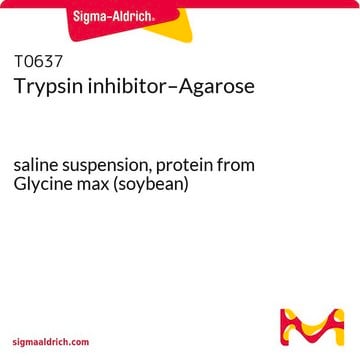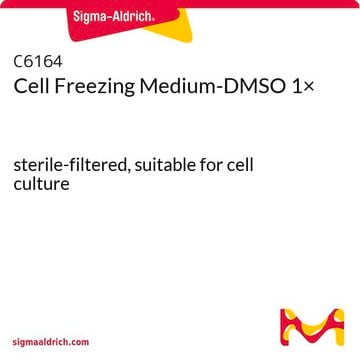SRE0044
Trypsin inhibitor
lyophilized powder, suitable for mammalian cell culture
Sinónimos:
Trypsin inhibitor from Glycine max (soybean), SBTI
About This Item
Productos recomendados
product name
Trypsin Inhibitor from Glycine max (soybean), Suitable for manufacturing of diagnostic kits and reagents, suitable for cell culture
biological source
Glycine max (soybean)
Quality Level
form
lyophilized powder
mol wt
14 kDa
technique(s)
cell culture | mammalian: suitable
solubility
0.067 M sodium phosphate buffer, pH 7.6: 1 mg/mL, clear, colorless to very faintly yellow
application(s)
diagnostic assay manufacturing
shipped in
wet ice
storage temp.
2-8°C
¿Está buscando productos similares? Visita Guía de comparación de productos
Application
Biochem/physiol Actions
Components
Unit Definition
Preparation Note
Solutions can retain activity when stored short-term at 2-8° C. Solutions are stable in frozen aliquots at -20°C.
signalword
Danger
hcodes
Hazard Classifications
Resp. Sens. 1 - Skin Sens. 1
Storage Class
11 - Combustible Solids
wgk_germany
WGK 3
flash_point_f
Not applicable
flash_point_c
Not applicable
Certificados de análisis (COA)
Busque Certificados de análisis (COA) introduciendo el número de lote del producto. Los números de lote se encuentran en la etiqueta del producto después de las palabras «Lot» o «Batch»
¿Ya tiene este producto?
Encuentre la documentación para los productos que ha comprado recientemente en la Biblioteca de documentos.
Los clientes también vieron
Nuestro equipo de científicos tiene experiencia en todas las áreas de investigación: Ciencias de la vida, Ciencia de los materiales, Síntesis química, Cromatografía, Analítica y muchas otras.
Póngase en contacto con el Servicio técnico












